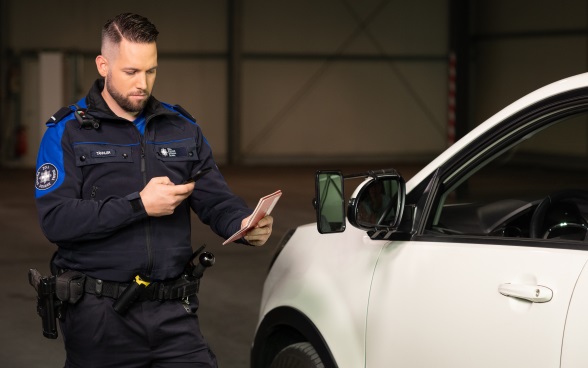Within the DaziT programme, the FOCBS was able to put around 40 mobile apps, other applications and basic IT services into operation.

New smartphone apps enable digital customs clearance for tourist traffic (QuickZoll) and the automatic activation of customs declarations when crossing the border (Activ and Periodic). Furthermore, thanks to internal apps, FOCBS employees can make more efficient queries regarding checks, collect receipts on the move and sign in and out of work via smartphone. This will significantly increase the security and effectiveness of operations.
The first version of the new Passar goods traffic system was put into operation on 1 June 2023. Transit, export and then import business cases will be gradually switched to Passar, which is being continuously refined and is progressively replacing the previous freight applications NCTS and e-dec. The new goods traffic system will be linked with other digital solutions to enable end-to-end digitalisation – for example, for obtaining vehicle numbers for car imports (Stadi).
Beer taxation is the first levy to be fully digitalised, with Biera. The Via portal can be used to buy an e-vignette and pay the lump-sum heavy vehicle charge (PSVA) digitally. Connection to the European toll system EETS is the first stage in the complete overhaul of the HVC recording system. The progressive automation of the collection of transport levies represents a significant contribution to making border crossings quicker.
The digitalisation of the collection of levies is also progressing. Beer taxation has been almost completely implemented electronically with Biera. Connection to the European toll system EETS is the first stage in the complete overhaul of the HVC collection system. The progressive automation of the collection of transport levies represents a significant contribution to making border crossings quicker.
Risk analysis is improved through participation in the European Import Control System 2. With the introduction of ICS2 in postal traffic, customs data in online trade is already transmitted upon dispatch from third countries.
The FOCBS pursues a hybrid cloud strategy in order to ensure the best possible quality, availability and security when offering its digital services to citizens and businesses. In line with the Federal Administration's cloud strategy, this involves combining proprietary private cloud services (in the Federal Office of Information Technology, Systems and Telecommunication, FOITT) with public cloud services from a commercial provider (Amazon Web Services, AWS). The public cloud is used, among other things, for business-related digital services in the areas of commercial goods traffic (Passar and peripheral systems) and transport levies (e-vignette, performance-related and lump-sum heavy vehicle charges). The data and information protection requirements are complied with at all times.
More info: Services
Back to mainpage





